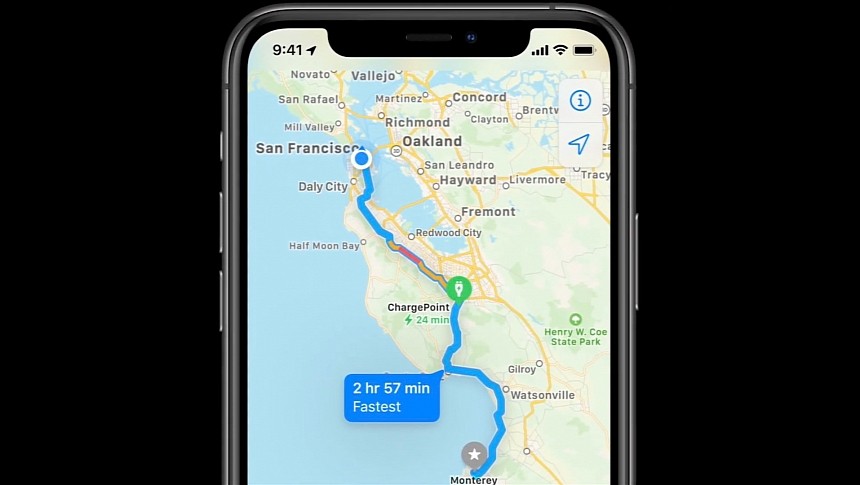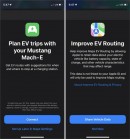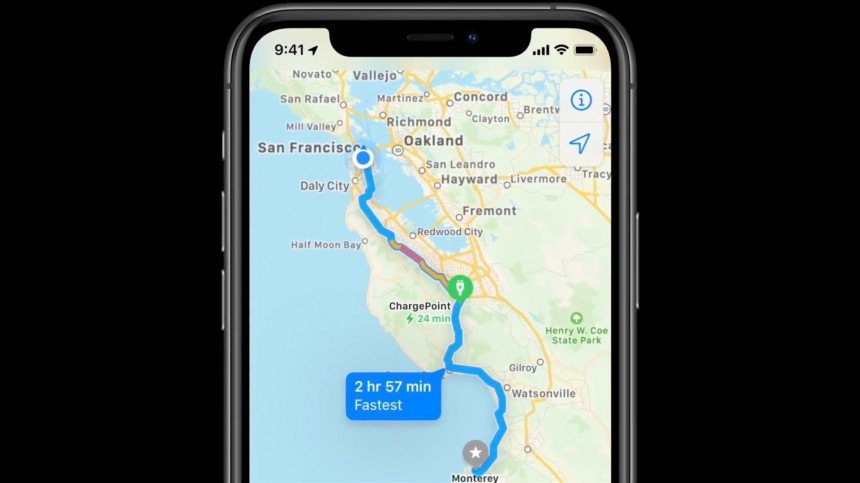Apple is working on multiple fronts to transform Apple Maps into a new-generation navigation solution. It's an ambitious plan, especially because Google Maps is currently the leader in the navigation space, but improvements like the detailed city experience and the support for offline maps are living proof Apple is committed to this plan.
However, one of the latest new-generation capabilities challenges Google Maps on another front. Apple Maps now offers a feature called EV routing, specifically aimed at electric vehicles, where the Cupertino-based tech giant offers deeper integration.
EV routing has a simple yet ambitious goal: to address range anxiety and make navigation more straightforward and convenient.
The EV routing works by monitoring the battery level and automatically suggesting charging stops when you can't reach the destination. Apple Maps can also configure routes to a destination farther than your current range by automatically looking for charging stations along the route.
Similar features have been available on Google Maps for some time, though only on Android Automotive. Google Maps also monitors the EV range thanks to the deeper vehicle integration available on Android Automotive, looking for compatible charging stations and suggesting stops when needed.
However, privacy-conscious users are afraid that providing Apple Maps with deeper vehicle integration provides the iPhone maker with access to a concerning amount of information.
The first thing EV owners must know if they use the dedicated EV routing in Apple Maps is that Apple does collect information from their vehicles but without tying it to their Apple ID. It means the data is anonymized, so nobody, not even Apple, can assign the collected information to a specific account.
If you're still concerned that too much information leaves your device, Apple says it's only collecting information that eventually helps improve your experience with the app. For example, the Cupertino-based tech giant gets battery information, including the charge level, before beginning a journey. It continues to monitor the battery level during the whole time spent behind the wheel with EV routing enabled, sending information to Apple for further processing.
Apple Maps EV routing also comes with a feature called "Improve EV Routing" that sends additional information to the iPhone maker for a simple purpose. Using it, the company can further refine the system as it collects the battery capacity, the state of charge, and range-related vehicle characteristics. It means Apple wants to polish the EV routing system by looking at more relevant data from your vehicle and trying to build patterns that could eventually improve the EV routing system for each user and car model.
Improving the EV routing enables further data collection, as Apple needs more information to refine its engine. For example, the company looks for and collects information related to charge stops added to the routes, the battery percentage when you arrive at the destination, the remaining travel range, the vehicle's energy consumption, and whether your battery died during the navigation.
The data is critical for Apple, as it helps the company determine if the EV routing component works properly and offers accurate estimates during navigation for you and your car. The purpose is to offer accurate numbers according to your profile (which includes the vehicle brand, model, battery capacity, and the chosen route).
While enabling this feature allows for more data collection, Apple says your identity is always protected. It's not tied to your Apple ID, and everything is stored anonymously. It means nobody can tell it's you whose battery died during the latest drive.
Apple has become very committed to improving Apple Maps, and the privacy component is critical in the long term.
However, Apple isn't alone in this push for enhanced privacy. Google has recently announced changes that will prevent authorities from requesting access to users' location data. Google Maps will store the location history locally, so the data will no longer leave the device to be uploaded to Google's servers.
Information stored by the Timeline feature in Google Maps, which is essentially a history of all places visited by a Google user, will stay on the device. Previously, Google automatically uploaded it to the cloud, so when a user requested to download it, they retrieved it from Google's servers. The information will now be stored on the device, so if a law enforcement agency wants to access it, contacting Google will no longer be required.
Google will still allow users to upload the data to the cloud for specific scenarios, such as when getting a new Android phone. However, the company promises that the location history will be protected by end-to-end encryption, so not even Google can access it. The changes will come into effect throughout 2024 and will be available for all users on Android and iPhone. Google promised to send notifications to every user when the updated privacy protections are available for each account.
EV routing has a simple yet ambitious goal: to address range anxiety and make navigation more straightforward and convenient.
The EV routing works by monitoring the battery level and automatically suggesting charging stops when you can't reach the destination. Apple Maps can also configure routes to a destination farther than your current range by automatically looking for charging stations along the route.
Similar features have been available on Google Maps for some time, though only on Android Automotive. Google Maps also monitors the EV range thanks to the deeper vehicle integration available on Android Automotive, looking for compatible charging stations and suggesting stops when needed.
However, privacy-conscious users are afraid that providing Apple Maps with deeper vehicle integration provides the iPhone maker with access to a concerning amount of information.
EV routing data collection
If you're still concerned that too much information leaves your device, Apple says it's only collecting information that eventually helps improve your experience with the app. For example, the Cupertino-based tech giant gets battery information, including the charge level, before beginning a journey. It continues to monitor the battery level during the whole time spent behind the wheel with EV routing enabled, sending information to Apple for further processing.
Apple Maps EV routing also comes with a feature called "Improve EV Routing" that sends additional information to the iPhone maker for a simple purpose. Using it, the company can further refine the system as it collects the battery capacity, the state of charge, and range-related vehicle characteristics. It means Apple wants to polish the EV routing system by looking at more relevant data from your vehicle and trying to build patterns that could eventually improve the EV routing system for each user and car model.
Improving the EV routing enables further data collection, as Apple needs more information to refine its engine. For example, the company looks for and collects information related to charge stops added to the routes, the battery percentage when you arrive at the destination, the remaining travel range, the vehicle's energy consumption, and whether your battery died during the navigation.
The data is critical for Apple, as it helps the company determine if the EV routing component works properly and offers accurate estimates during navigation for you and your car. The purpose is to offer accurate numbers according to your profile (which includes the vehicle brand, model, battery capacity, and the chosen route).
While enabling this feature allows for more data collection, Apple says your identity is always protected. It's not tied to your Apple ID, and everything is stored anonymously. It means nobody can tell it's you whose battery died during the latest drive.
Google Maps privacy improvements
However, Apple isn't alone in this push for enhanced privacy. Google has recently announced changes that will prevent authorities from requesting access to users' location data. Google Maps will store the location history locally, so the data will no longer leave the device to be uploaded to Google's servers.
Information stored by the Timeline feature in Google Maps, which is essentially a history of all places visited by a Google user, will stay on the device. Previously, Google automatically uploaded it to the cloud, so when a user requested to download it, they retrieved it from Google's servers. The information will now be stored on the device, so if a law enforcement agency wants to access it, contacting Google will no longer be required.
Google will still allow users to upload the data to the cloud for specific scenarios, such as when getting a new Android phone. However, the company promises that the location history will be protected by end-to-end encryption, so not even Google can access it. The changes will come into effect throughout 2024 and will be available for all users on Android and iPhone. Google promised to send notifications to every user when the updated privacy protections are available for each account.












